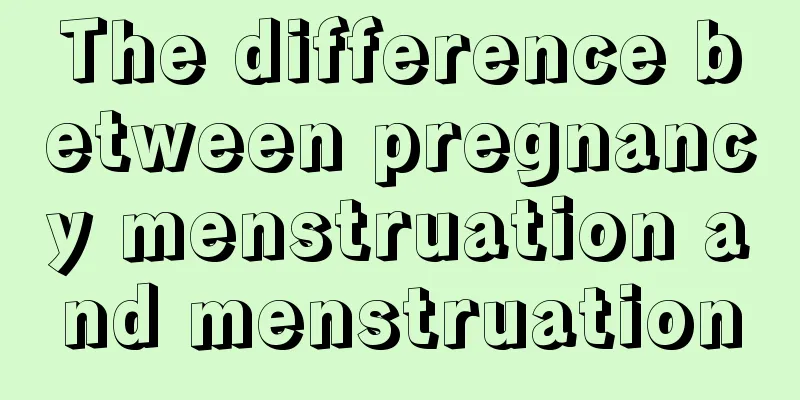The difference between pregnancy menstruation and menstruation

|
There is actually a difference between pregnancy menstruation and normal menstruation, which is something that many friends who are pregnant for the first time do not know. Pregnancy menstruation usually occurs in the first three months of pregnancy, and there will be a small amount of bleeding, which is normal and is also called pregnancy menstruation. Menstruation will stop after pregnancy, but some friends will have a small amount of bleeding in the first period, so you need to pay more attention. What is pregnancy menstruation Pregnancy menstruation, as the name suggests, is menstruation during pregnancy. However, pregnancy menstruation is not the "menstruation" of the normal physiological period, but refers to a small amount of bleeding in the first 3 months of pregnancy. Many women do not know they are pregnant because of their menstrual period. Modern medicine believes that the human chorionic gonadotropin produced by pregnant women cannot transform the corpus luteum of the ovary into the corpus luteum of pregnancy, and the ovarian function continues to be active, resulting in a small amount of monthly vaginal bleeding. After 3 to 4 months of pregnancy, the sex hormones secreted by the placenta replace the ovarian function. So there will be no more periodic bleeding. A woman will no longer have her period after she becomes pregnant. However, a small number of women still experience vaginal bleeding on the date of their next menstrual period after becoming pregnant. Pregnant women often mistakenly believe it is menstruation and do not know they are pregnant. This situation after a woman becomes pregnant is called "pregnancy menstruation." What is the cause of menstruation during pregnancy? There may be a small amount of bleeding when the fertilized egg implants, and the bleeding time generally does not exceed 3 days. Apart from this, there is generally no vaginal bleeding during pregnancy. Otherwise, you need to consider the possibility of threatened abortion, ectopic pregnancy, etc. Generally speaking, the most common causes of vaginal bleeding in early pregnancy are: 1. Physiological bleeding: After conception, some women will still have a small amount of bleeding during the month, generally without other accompanying symptoms (such as abdominal pain, menstrual discomfort). This may just be a physiological response to the implantation of the fertilized egg. This condition does not require treatment, just keep the vulva clean. 2. Abortion: When the decidua basalis bleeds, the placenta and uterine wall separate and stimulate the uterus, causing the uterus to contract, the cervix to dilate, and blood to flow out of the uterus. This type of bleeding is often accompanied by lower abdominal pain. The amount of bleeding increases from a small amount to a large amount, the color changes from dark to red, and the abdominal pain gradually develops from dull pain to more severe pain. 3. Ectopic pregnancy: When the fertilized egg develops to a certain extent, the wall of the fallopian tube will rupture and cause bleeding. Because this bleeding is intra-abdominal, vaginal bleeding may not be significant. However, this kind of blood loss often leads to fainting, shock, etc., and if not treated in time, it may cause the patient's death. 4. Hydatidiform mole: Hydatidiform mole miscarriage usually begins 2-3 months after amenorrhea. Bleeding is usually intermittent and small in quantity, but some cases may have repeated and heavy bleeding. 5. Overwork: If a pregnant woman is too tired or under great work pressure in the early stages of her pregnancy, it may also cause a small amount of vaginal bleeding, so she should go to the hospital for examination in time. Symptoms of pregnancy and menstruation The characteristics of pregnancy menstruation are less bleeding, lighter color, and shorter duration. It is different from any previous menstruation. In fact, this is not real menstruation. This phenomenon occurs within 3 months of pregnancy and usually only occurs once, but some pregnant women experience it 2-3 times. If vaginal bleeding is caused by disease, if it is not treated in time, it will lead to corresponding disease symptoms and affect the health of the mother and fetus. |
<<: The difference between the symptoms of miscarriage and menstruation
>>: The difference between fetal movement and bowel movement
Recommend
Can I eat enzyme plum during menstruation?
It is not recommended to eat enzyme plums during ...
How to care after removing makeup
Many workplaces now require women to wear light m...
How to determine if it is mastitis?
During the lactation period, women's immunity...
WHO declares monkeypox no longer a "public health emergency of international concern"
World Health Organization Director-General Tedros...
What causes breast pain?
Breast health is very important to women, because...
What should girls eat to treat uterine cold
Although uterine cold is not a very serious disea...
Less vaginal discharge after ovulation
When women reach sexual maturity, they will have ...
How to choose a belly band, the best one is the one that suits you best
After ten months of pregnancy, the originally enl...
Why does the abdominal pain occur after the ring is inserted?
IUD insertion is a very good method of birth cont...
What should I do if bleeding starts again after the lochia is clear?
After giving birth, women will have a period of b...
What to do if abdominal pain is unbearable after abortion
When faced with an unexpected pregnancy and not r...
Normal underwear secretion picture
Female secretions are the fluid secreted by the f...
What are the effects of eyebrow tattooing during menstruation?
Menstruation is also known as period. During mens...
What causes vaginal odor?
Women can easily find out if there is an odor in ...









